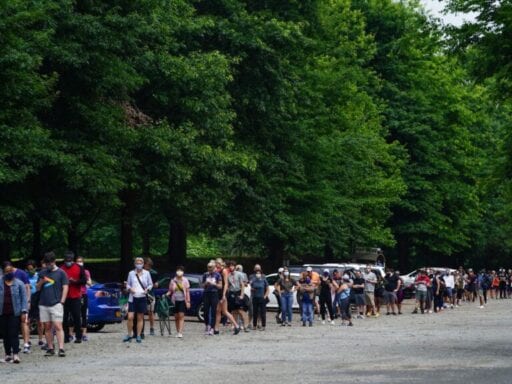“Voters have been disenfranchised across the state.”
The 2020 Election Day disasters keep rolling in.
After long lines in the Wisconsin primary two months ago, Georgia voters, who are trying to cast their ballots in the state’s primary elections, are being forced to wait hours in line as some polling places have closed and others have experienced malfunctioning voting equipment.
The problems appear to be centered in four counties: Cobb, DeKalb, Fulton, and Gwinnett, according to civil rights attorneys and local reports. The city of Atlanta sits in Fulton County; Cobb, DeKalb, and Gwinnett counties comprise some of the city’s suburban areas.
“Voters have been disenfranchised across the state. We believe a high proportion of them are African American,” Kristen Clarke, president for the Lawyers’ Committee for Civil Rights Under Law, told Vox.
These counties have political significance; with Atlanta’s suburbs trending blue in recent years, they could well make Georgia a true battleground state in the 2020 presidential and US Senate elections. There are two US Senates in Georgia up this year; voters are set to choose the Democratic nominee to challenge Sen. David Perdue (R) among other races. Because the other Senate election is a special election, there will be an all-party primary on November 3, meaning no party nominees will be chosen on Tuesday.
The delays are also raising concerns about the systemic disenfranchisement of black Americans — a longstanding issue that’s exacerbated by some state governments’ policy decisions but one that’s particularly salient this year, as Covid-19 has complicated voting procedures. Basketball star LeBron James tweeted his point out that as protests over police brutality continue in the US, barriers to voting and suppression for black Americans must also be closely examined.
Everyone talking about “how do we fix this?” They say “go out and vote?” What about asking if how we vote is also structurally racist? https://t.co/GFtq12eKKt
— LeBron James (@KingJames) June 9, 2020
The New York Times used a drone to capture how long some precinct lines in Atlanta stretched.
This drone footage shows a long line of voters waiting to cast ballots in Atlanta on Tuesday. Georgia election officials, poll workers and voters have reported major trouble with voting in Atlanta and elsewhere.
Read the latest. https://t.co/wRnW8f5tng pic.twitter.com/BVU9J9CF79
— The New York Times (@nytimes) June 9, 2020
There’s no estimate of how many voters are being impacted, but Clarke told Vox her group’s Election Day hotline has received “thousands” of calls. Some people left the voting line after waiting for hours. Although polls are scheduled to close at 7 pm Eastern, Clarke’s organization is preparing to go to court to keep polls open later if elections officials in these four counties don’t extend polling hours to ensure voters have a chance to cast their ballots.
Atlanta Mayor Keisha Lance Bottoms first reported problems in some Atlanta precincts, including voting machines not working as early as 7:30 Tuesday morning.
This seems to be happening throughout Atlanta and perhaps throughout the county. People have been in line since before 7:00 am this morning. https://t.co/l28JvxhZxi
— Keisha Lance Bottoms (@KeishaBottoms) June 9, 2020
Georgia Secretary of State Brad Raffensperger’s office has said it would launch an investigation, and Raffensperger called the lines and delays “unacceptable” in a statement. Georgia House Speaker David Ralston has also called for an investigation.
“My office has opened an investigation to determine what these counties need to do to resolve these issues before November’s election,” Raffensberger said.
The 2018 midterms and highly contested governor’s race (where former Secretary of State and current Gov. Brian Kemp was on the ballot) saw allegations of voter suppression after voting machines in some precincts failed and nearly 50,000 voter registrations were put on hold. Democratic gubernatorial candidate Stacey Abrams refused to concede the race to Kemp after losing by just 1.4 points. Abrams has continued to work on voting access issues in the state.
Clarke said launching an investigation in the middle of an ongoing election isn’t the message voters need to hear in order to be confident in an election’s integrity.
“State officials failed voters today,” Clarke said. “Georgia has been ground zero when it comes to voter suppression in our county and sadly that remains the case today.”
Support Vox’s explanatory journalism
Every day at Vox, we aim to answer your most important questions and provide you, and our audience around the world, with information that has the power to save lives. Our mission has never been more vital than it is in this moment: to empower you through understanding. Vox’s work is reaching more people than ever, but our distinctive brand of explanatory journalism takes resources — particularly during a pandemic and an economic downturn. Your financial contribution will not constitute a donation, but it will enable our staff to continue to offer free articles, videos, and podcasts at the quality and volume that this moment requires. Please consider making a contribution to Vox today.
Author: Ella Nilsen
Read More



